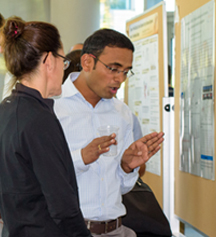Of Note
FL Research Fest Congratulates Poster and Presentation Winners
October 21 marked the seventh annual Research Fest: Scientific Symposium and Vendor Show on the The Scripps Research Institute (TSRI) Florida campus, organized by the Scripps Florida Society of Research Fellows (SF-SRF). The event was an opportunity for postdoctoral fellows and graduate students to showcase their research through oral presentations and posters.
Awards for distinguished oral presentations by postdoctoral fellows went to:
- 1st - Cesare Orlandi of the Martemyanov lab, “The orphan receptor GPR158 is a novel stress-induced modulator of signaling in depression”
- 2nd - Jeffrey Rudolf of the Shen lab, “Biosynthesis of the Antibiotics Platensimycin and Platencin”
- 3rd - Tarsis Brust of the Bohn lab, “A G protein-biased ligand of the kappa opioid receptor is analgesic but does not cause sedation or dysphoria”
Awards for postdoctoral fellow poster presentations went to:
- 1st - Suzanne Rzuczek of the Disney Lab, “Precise Small Molecule Recognition of a Toxic RNA Repeat Expansion”
- 2nd - Guohui Pan of the Shen Lab, “Discovery of leinamycin family of natural products: Nature’s own combinatorial biosynthesis”
- 3rd - Vinay Mandati of the Kissil lab, “Crb3 regulation of cell proliferation is mediated through turnover of the Hippo pathway components Amot and Yap”
Afshin Khalili from the Tomchik lab won the best graduate abstract competition and presented a talk titled "Organization of opposite learned behaviors after ‘trauma’ in a mini- brain."
ResearcHERs Brings Neuroscience to the Public
Is it possible to retrain a brain? TSRI Professor Hollis Cline, thinks so. Cline’s laboratory focuses on early brain development and how brain circuits change over time.
“Your brain has one billion neurons, and each of those neurons has a thousand connections,” said Cline, who serves as chair of the Department of Molecular and Cellular Neuroscience and director of the TSRI Dorris Neuroscience Center. “These cells are always moving and dancing.”
Cline presented her research at the latest “ResearcHERs: Women Scientists of TSRI” lecture and reception on October 26. This lecture series is organized by the TSRI Female Faculty Group and is free to the public.
Cline compared neurons to trees, with connections that grow and branch out. Scientists are increasingly understanding how these branches are shaped by the stimuli the brain receives. For example, Cline showed the audience how neurons in tadpoles pull back their connections when the tadpoles are in the dark and grow new connections when the tadpoles are in a visually stimulating environment.
This work suggests that exposing the brain to certain stimuli—in essence, “training the brain”—could be a way to treat learning deficits and even age-related cognitive decline.
Cline also noted the environment at TSRI is ideal for translating discoveries from the laboratory into therapies to help patients. “We can work closely with chemists here, and they’re the ones who can develop small molecules for drug development,” she said.
Visit the TSRI website for more information on public events at TSRI.
Send comments to: mikaono[at]scripps.edu















